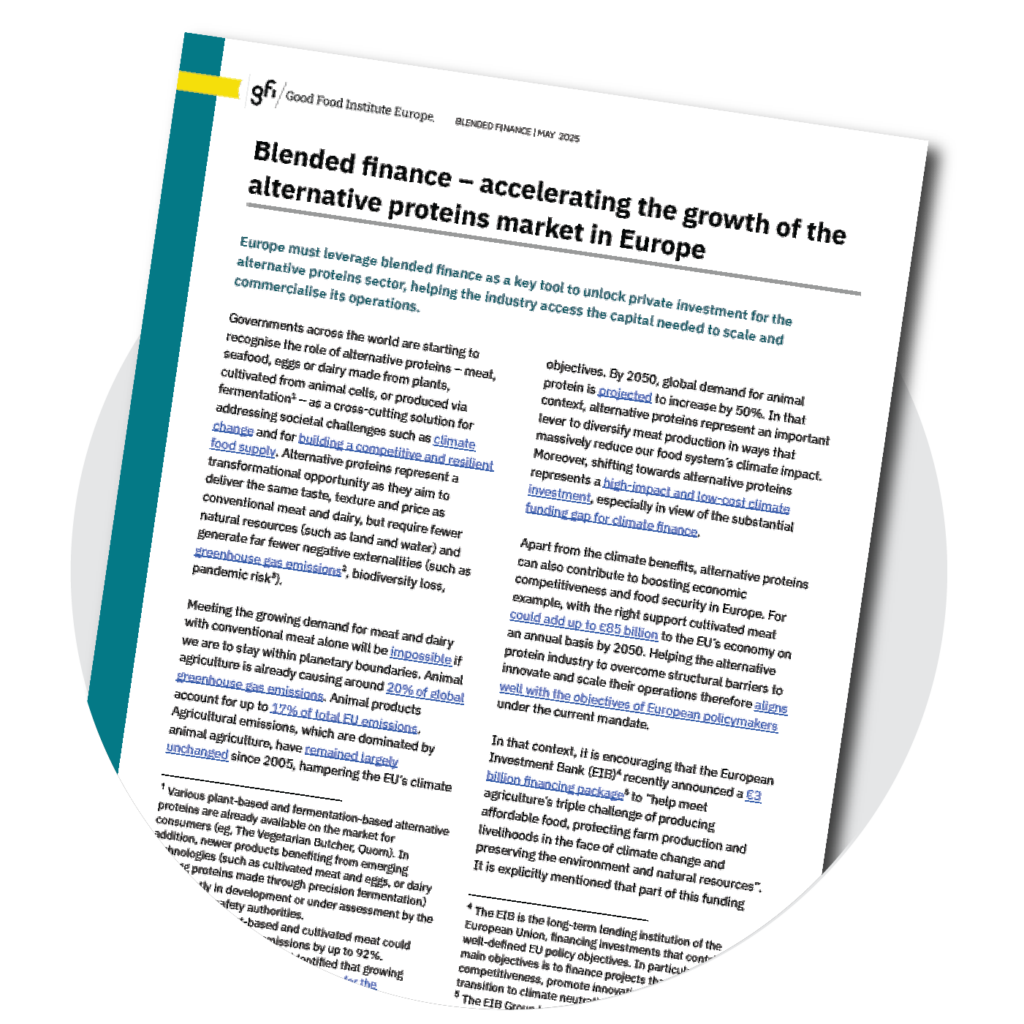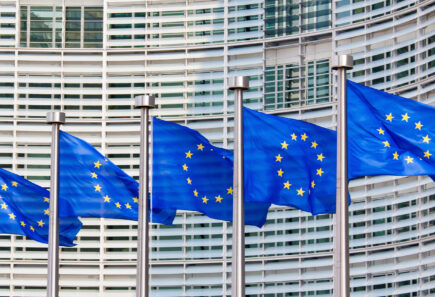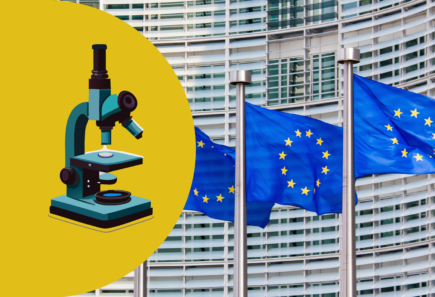
Alternative proteins in the European Union
The EU represents the third-largest economy in the world and the largest single market. With its world-leading research institutions and a huge array of innovative entrepreneurs and businesses, Europe has been the home of some of the most exciting developments in protein diversification to date. This sector has the potential to create up to 9.8 million jobs globally by 2050 but, other international players are beginning to recognise the sector’s potential. Catalysing the field to maximise the benefits in Europe therefore demands urgent action across multiple policy areas: agriculture and food, public health, research and innovation, regulation, and industrial strategy. This page is your guide to alternative proteins in the EU.

Check out our 3 pager on how the EU can champion protein diversification
The EU’s alternative protein opportunity
Leading industrial food biotech
Europe has been at the centre of an explosion in academic research into protein diversification but the EU’s entrepreneurs are struggling to commercialise the findings of the region’s scientists.
This is a particular problem for the fermentation sector as the large-scale facilities needed to ramp up production of these foods don’t exist across Europe, leading to a danger that new products will get stuck in the development phase or be manufactured abroad.
And as countries like the United States and China now prioritising investment in these areas, we risk losing our edge and falling behind. With the EU preparing to invest heavily in cleantech and biomanufacturing through initiatives such as the Clean Industrial Deal, the European Biotech Act, and the revised Bioeconomy Strategy, now is the perfect opportunity to support the scale-up of these food innovations. This will help the EU deliver future-proof jobs.
Fostering research and innovation
The EU is home to many of the world’s leading universities and scientists – and the EU also needs to do more to capitalise on Europe’s growing R&I expertise.
Ensuring funding is made available to drive forward investment into Europe’s world-leading food biotechnology sector – from early development through to commercialising new products to unleash the huge environmental and public health benefits of these foods.
Just as they’ve supported renewable energy research and innovation, the EU must invest in developing delicious, affordable plant-based, fermentation-made, and cultivated meat – making sustainable options an appealing choice across Europe.
Safeguarding resilience and food sovereignty

Recent global shocks have shown the pressing need to strengthen the resilience of European agrifood supply chains, and increase the continent’s food sovereignty.
As global demand for protein keeps growing, it is increasingly clear that diversification of the protein supply is one of the most efficient ways to ensure our food system can remain robust amid global crises.
Alternative proteins hold significant promise in helping deliver on the EU’s aspirations for food sovereignty in this context and could play a key role in a future-proof EU Protein Strategy.
The European plant-based meat and dairy sectors have experienced significant growth in recent years, serving as drivers of investment and job creation across the continent and these foods are becoming mainstream in some countries.
This growing sector offers huge opportunities for European farmers to increase production of locally grown crops such as legumes as raw ingredients and the EU can help support this transition. By strengthening supply chains, boosting innovation and ensuring consumers have a wide choice of affordable and sustainable foods, there is a real opportunity to incentivise further growth in this field and support European farmers to contribute to and benefit from this market.
Priorities for EU Policymakers
In order for the EU to effectively capitalise on the potential of alternative proteins, it must ensure there is coordinated, strategic oversight of its development. To achieve this, we recommend the adoption of the following policies:
Political leadership

Political leadership in this nascent field is of great importance. The EU must recognise the role of alternative proteins as a mitigation strategy for key climate and public health pressures across EU policies, while simultaneously building industrial competitiveness and strategic autonomy.
To achieve this, they should:
- Develop a European Alternative Protein Strategy, with the primary goal of establishing the EU as a global leader in this space by 2030. This strategy should identify and prioritise the multiple policy levers at the EU’s disposal to build a favourable and dynamic research, regulatory and industry ecosystem. It is important within this to ensure coherent and aligned policies that build towards a broad vision. In support of this, anchoring alternative proteins within the remit of an individual or department’s portfolio could be beneficial.
- Ensure the regulatory path to market for alternative protein products remains transparent and clear, while maintaining the EU’s world-leading food safety standards
Research and Innovation
Investment in research and development (R&D) is crucial, and the commission should earmark at least €50 million annually at the EU level in funds for investment into alternative proteins until 2027 to unlock the significant economic growth and job creation predicted in the alternative protein sector, and ensure Europe can realise those opportunities and remain a leader on the international stage. To maximise the impact of this investment, the commission should:

- Ensure a significant proportion of these funds are directed into the open-access research needed to accelerate progress for alternative proteins.
- Focus on creating calls to improve the taste and reduce the price of alternative proteins.
- The EU should set up a Horizon Europe Partnership on Protein Diversification as a mechanism to facilitate a longer-term view of how to strategically deploy R&D funds in this area, and allow for valuable collaboration with stakeholders, companies, and member states.
- Provide funding to universities with high potential for the establishment of cross-departmental plant-based, fermentation-made and cultivated research tracks.
- Create innovation hubs for alternative proteins dedicated to accelerating their R&I development and commercial applicability. The centres should act as an accelerator between the public and private sectors, bringing together researchers, universities and companies.
- Provide investment into open-access R&D to match funding provided by foundations, corporations, and others.
- Ensure there are opportunities to take advantage of cascading uses of biomass by ensuring cross-over in funding between food and non-food sectors.
- Support CBE-JU to dedicate funding towards plant-based foods, such as research into ingredients for plant-based meat and feedstocks for fermentation.
Infrastructure & scale up
As a sector in its infancy, laying strong foundations on which alternative proteins can grow is crucial. While private investment plays an important role, the solutions offered by alternative proteins are too important to be left to the market alone, particularly in the context of current economic headwinds. Public funding is therefore crucial to foster a resilient, thriving ecosystem for research and innovation, and de-risk investment in the sector.
Blended finance can play a key role in this effort, helping the industry to innovate and scale by relying on public capital to attract and mobilise private investment. Through targeted capital deployment and risk sharing, the EIB and other public funders can create the conditions needed for private sector investment to scale alternative protein infrastructure.

Priorities for infrastructure include:
- Provide public loan guarantees to mitigate risk for alternative protein companies, as has been trialled for other sectors such as renewable energy.
- Provide public funding for the establishment of alternative protein production facilities, including incentives to repurpose infrastructure from other industries and/or from offline manufacturing.
- Create funds to offer leasing and financing of the equipment and facilities necessary for the alternative protein industry, such as extruders for plant-based meat production or fermentors for cultivated and fermentation-made products. Enabling manufacturers to lease needed production equipment would allow them to replace high-cost, episodic capital expenditures with lower-cost, predictable operating expenses.
Labelling
It is also pivotal to ensure fair labelling rules that allow producers of alternative proteins to clearly convey the nature of their products to consumers:
- Current restrictions on the use of dairy-related terms such as milk and yoghurt for plant-based products should be removed.
- As cultivated meat and precision fermentation products come to market, rules should ensure they can clearly communicate their compositional equivalence to their conventional counterparts. This is particularly important to safeguard the many consumers with intolerances or allergies to meat, seafood, eggs and/or dairy.
Regulation
Robust food safety regulation is vital to ensuring that European consumers can have confidence in novel foods such as precision fermentation and cultivated meat.
Before this food can be sold anywhere in the EU, a thorough and evidence-based assessment of its safety and nutritional value must take place under the Novel Food Regulation – one of the most robust systems in the world.
To secure the regulatory path to market, the EU should:
- Safeguard the Single Market against any regulatory fragmentation.
- Strengthen the capacity and capabilities of the European Food Safety Authority (EFSA) to improve the implementation of the existing regulatory framework, support innovation, and prevent unnecessary delays to product authorisations.
- Enable EFSA to hold substantive pre-authorisation dialogue with producers – particularly important for small and medium-sized enterprises – and provide increasingly thorough guidance to support applications.
EU alternative protein company database
The EU is already one of the biggest markets for alternative proteins in the world, with sales worth over €6.5 billion in 2022. With demand continuing to outstrip supply, and plant-based and fermentation options representing a tiny fraction of the overall meat and dairy market, further investment will be crucial to realise the full potential of these foods.
Use our database to explore the landscape of EU plant-based, cultivated meat and fermentation companies. This tool will help you stay up to date on new companies and products in the space, find a manufacturing partner, or identify groundbreaking startups.







